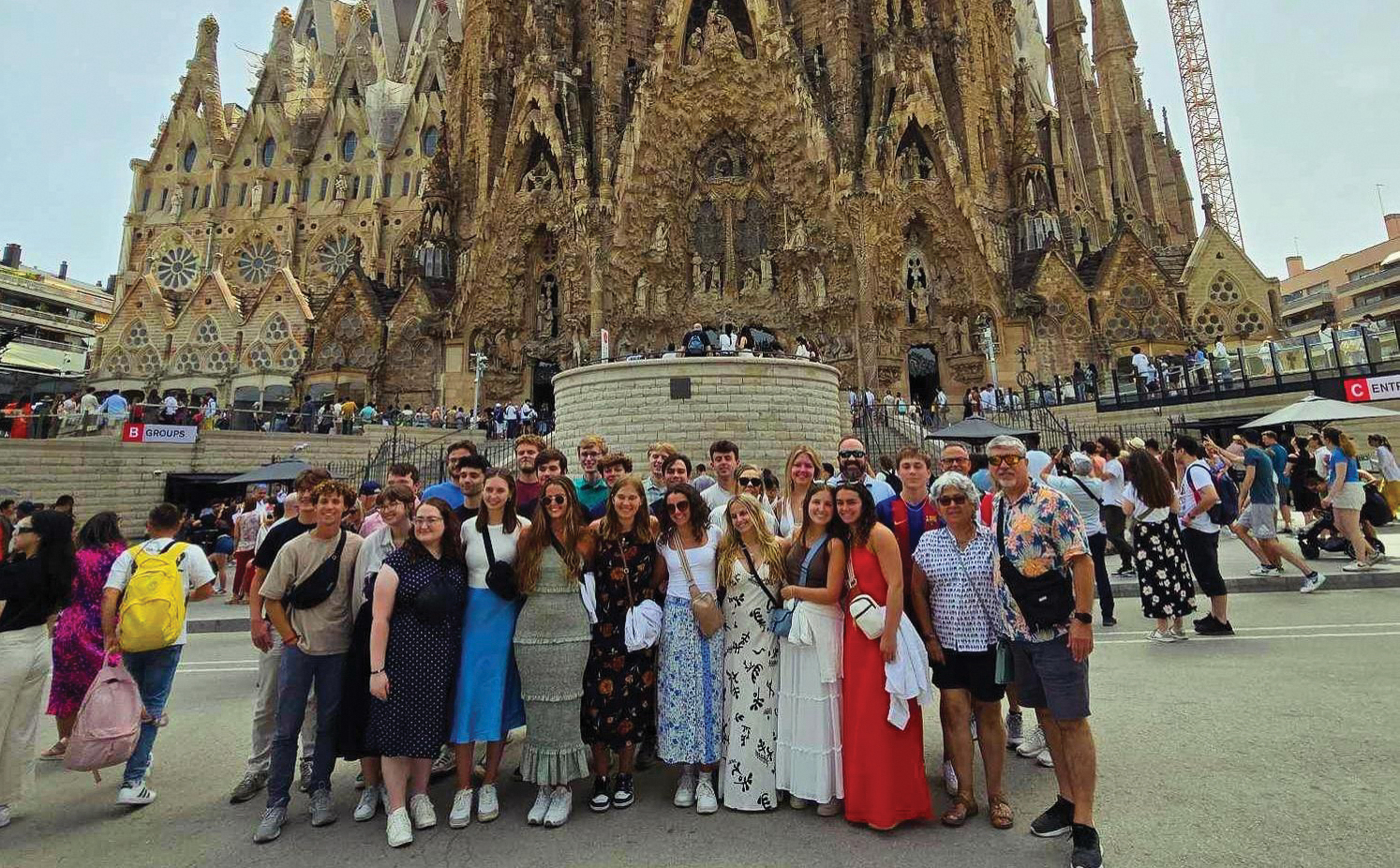
Auburn Engineering is more than attending class, earning top grades and having a successful career after graduation. It’s about taking part in the best student-centered engineering experience in America. Auburn Engineering students can take that experience worldwide thanks to Engineering Global Programs.
Germany, Spain, Italy and South Korea are just a few of the locations that Auburn students can explore. Working in lockstep with Auburn Abroad, Engineering Global Programs is committed to ensuring Auburn students and visitors have educational and cultural experiences that enrich their lives.
Dean Hendrix, associate dean for undergraduate studies and program assessment, said traveling and studying internationally offers many advantages, including learning about and experiencing different cultures, building a worldwide network of contacts and learning a new language and skill set.
“An Engineering Global Programs experience is truly transformative,” said Hendrix, who has also served as director of Engineering Global Programs since 2022. “Our students gain technical skills and develop a global perspective that makes them better students, employees and people.
History of Engineering Global
In 2008, Bob Karcher, then assistant dean for engineering student services, wanted Auburn Engineering students to have opportunities to go abroad and take courses that would apply to their degree tracks.
A trip to Australia sparked the idea of Engineering Global Programs led Karcher to formalize a deal with the University of Western Australia for an exchange program each year.
Shortly after, Auburn Engineering began to expand its global opportunities in Germany through student and faculty exchanges.
The program took a big leap when Karcher was offered to lead Auburn’s Engineers Without Borders (EWB) chapter, which he made an official chapter of the national EWB. By now, Auburn Engineering had a few exchanges and an official EWB program, but Karcher still felt the university could do more.
He went to former engineering Dean Christopher Roberts, now president of Auburn University, and asked for an official role to help engineering students travel overseas.
“He was 100% on board with the idea and gave me his full support,” Karcher said.
That’s how Karcher became director of something that would soon be named Engineering Global.
“I was very interested in having our engineering students do something abroad in engineering,” he said. “They could have gone to Auburn Abroad and studied any number of subjects, but I wanted our engineering students to have the opportunity to begin taking coursework overseas that would apply to their major and get involved with global companies that would give them real-world experience.”
As director of Engineering Global, he worked with faculty throughout Auburn to develop concurrent degree programs in Germany, faculty-led programs in Spain and Italy and additional exchange programs in Europe.
Karcher retired from Auburn in 2020 and handed the reins of Engineering Global to Hendrix, whom Karcher coined a “champion” of the program.
Exchange Programs
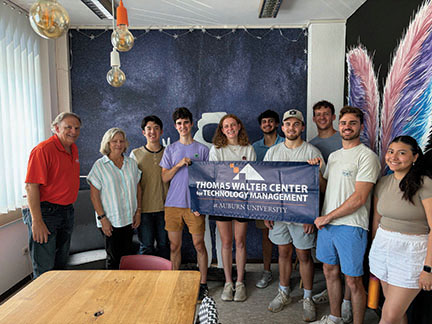
Engineering Global Programs has five active exchange programs: three in Germany, one in Italy and its newest program in Morocco.
The exchange program’s setup is the same for each country — students spend a semester living and studying at one of the partner universities.
Partner universities include:
• Technical University of Applied Sciences Würzburg-Schweinfurt, Germany
• Karlsruhe University of Applied Sciences, Germany
• University of Applied Sciences Offenburg, Germany
• Al Akhawayn University, Morocco
• Polytechnic University of Turin, Italy
Hendrix said the unparalleled level of immersion sets the exchange program apart.
“Unlike other programs, an exchange offers the most comprehensive experience, immersing individuals in a different culture, school and language,” he said. “For students eager to truly understand Germany, Italy or Morocco, the exchange program provides an unbeatable opportunity to dive deep into the local way of life.”
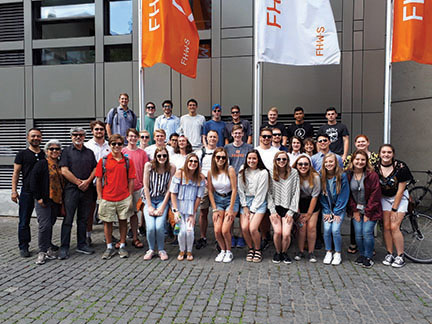
Students can use their U.S. passports to travel throughout their host country and surrounding countries, experiencing different cultures, beliefs, languages and food.
Additionally, Hendrix said the cultural experience is immeasurable because many students graduating with an Auburn Engineering degree will likely work for a company that does international work.
International Engineering Summer Programs
The Thomas Walter Center offers opportunities to study abroad in Pamplona, Spain, and Würzburg, Germany.
Jorge Valenzuela, Philpott-WestPoint Stevens Professor in the Department of Industrial and Systems Engineering, leads the program in Pamplona. Students work in groups mentored by Auburn University faculty and Spanish company sponsors on projects involving problem-solving techniques, including data collection, analysis, computational modeling and design problems.
Students work on a consulting project for a Spanish business client, supported by the Universidad Publica de Navarra (UPNA) and the Colegio de Ingenieros Tecnicos Industriales de Navarra. Students from UPNA also participate, providing a European engineering perspective.
According to John Evans, director of the Thomas Walter Center, the client defines the project and student teams prepare reports and present solutions.
Valenzuela added that students are exposed to cultural and global experiences through interactions with Spanish peers and visits to local restaurants and cultural sites, including tours to Olite, San Sebastian and Barcelona.
The Germany program is part of the Thomas Walter Center’s International Business-Engineering-Technology curriculum minor. This two-year minor provides education and training to develop new products, business models and plans for start-up companies. Students spend the first four weeks in Pamplona focusing on coursework and developing prototypes, then travel to Würzburg for another four weeks. At the end of the program, students present their work to faculty and industry sponsors.
Engineering in the Arts
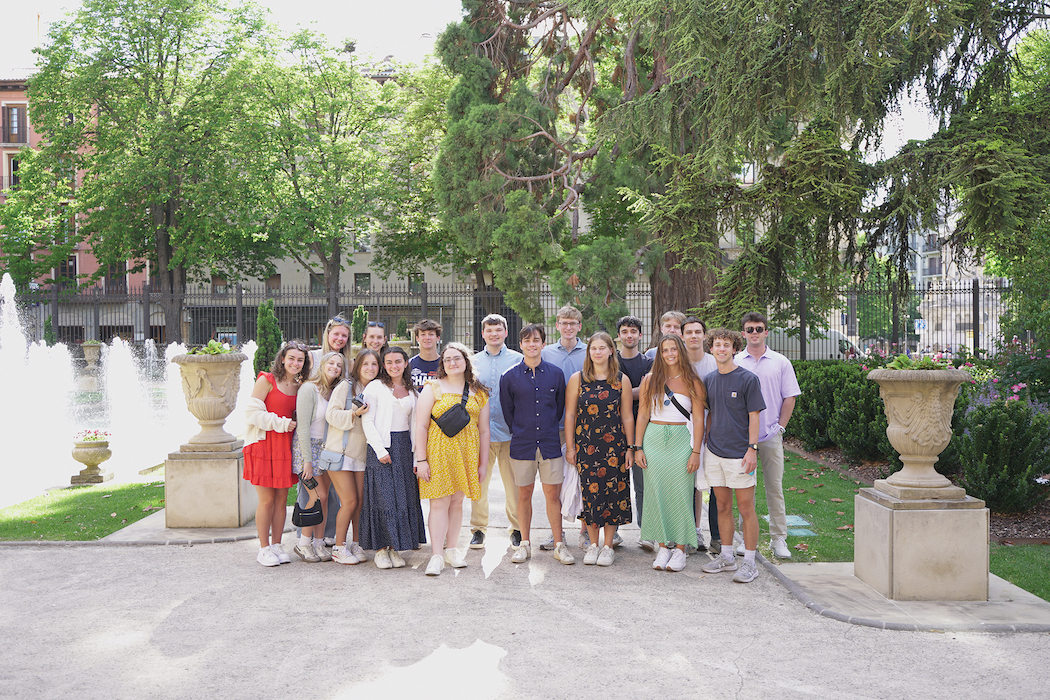
Michael Zabala, Auburn Alumni Engineering Council Associate Professor in mechanical engineering, offers a summer course in Florence, Italy. The course focuses on the Italian Renaissance and specific scientists and engineers like Galileo, Leonardo da Vinci and Michelangelo. The course counts as a three-credit-hour technical elective required for all engineering students. It begins a week after finals with background instruction at Auburn and then continues for four weeks in Florence.
“It’s a faculty-led program, and students are more on the independent side of things,” Zabala said.
The course includes about 20 lectures, each lasting two hours in the mornings, paired with afternoon excursions related to the lecture content. Past outings included the opera in Rome and the Vatican Museum.
The course is a mini-semester summer class, allowing students to return to Auburn in mid-June.
Zabala noted that students who register are genuinely interested in the educational aspect and the value of an overseas experience, making it a rewarding classroom experience.
Elizabeth Weidl, ’24 aerospace engineering, described her 2023 experience as one of the best at Auburn. She said the program in Italy taught her to love learning again and relish gaining new knowledge.
“The thing that attracted me to the course was that it is a perfect combination of engineering and experience,” Weidl said. “Not only did the trip reignite my passion for learning, but spending time in Florence created a new spark in me to travel and have more experiences.”
Joint Senior Design
For the first time in the fall of 2023, seniors in electrical and computer engineering traveled to Germany through an exchange program with the Technical University of Applied Sciences Würzburg-Schweinfurt (THWS).
Thaddeus Roppel, associate professor emeritus, said two students from the capstone class collaborated with two THWS students on a joint senior project.
Katie Wolfe, now an Auburn graduate student, visited THWS in the spring of 2024 with fellow senior Elijah Parker. They teamed with THWS students to develop a system for farming sustainability.
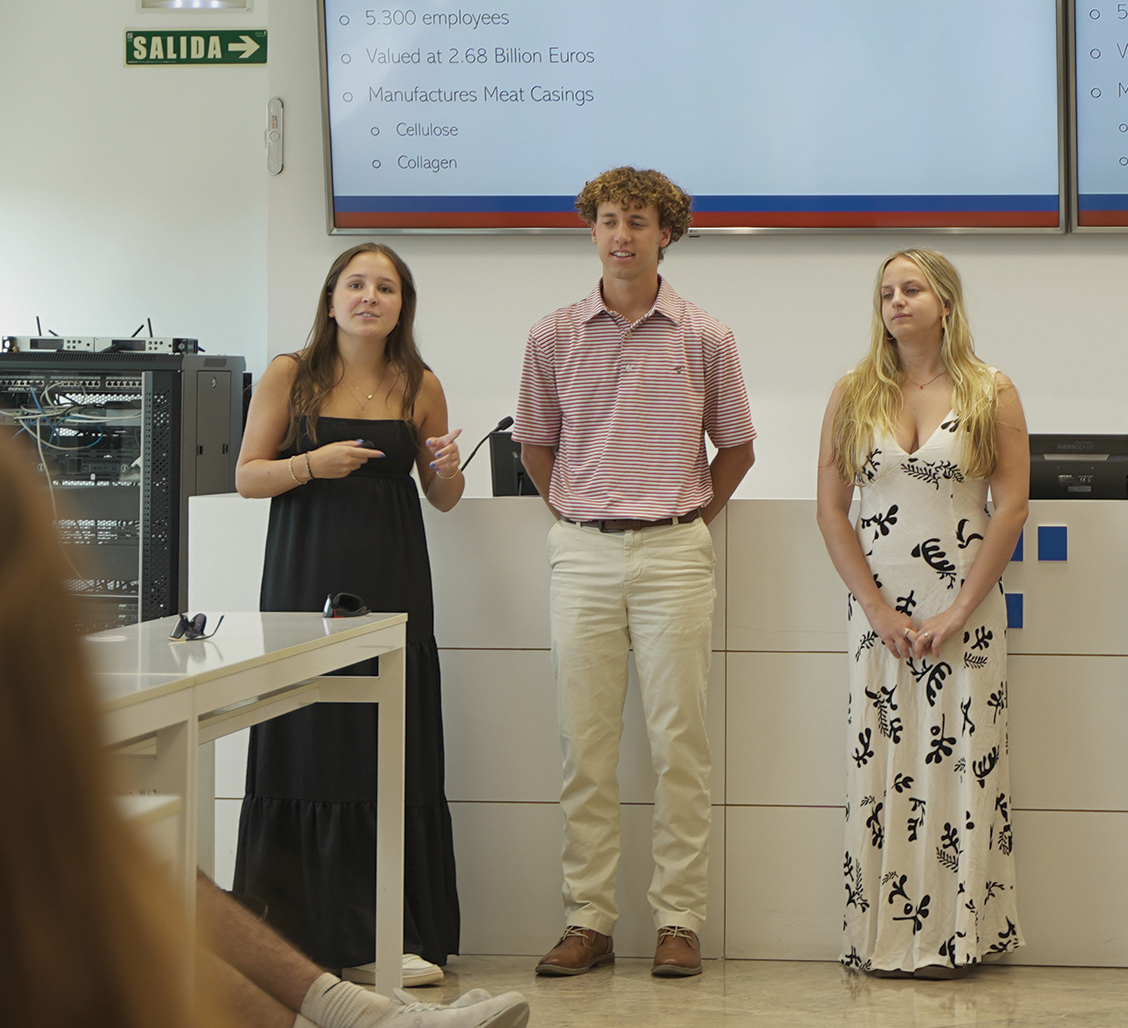
The teams collaborated via weekly Zoom calls and emails for months. They met in person in Germany for 10 days and later in Auburn for another 10 days, eventually presenting their project to faculty.
Wolfe mentioned that the Germany experience blended cultural and academic activities, including trips to Munich, Berlin, and the Dachau Concentration Camp Memorial Site.
“Academically, we spent most of each day on our project, but we also toured THWS labs and met professors,” Wolfe said. “For fun, we visited restaurants, biked to a monastery and saw our German team members’ hometowns.”
Roppel said the program is continuing with more students signed up for fall 2024 and spring 2025.
Engineers Without Borders
The Auburn chapter of Engineers Without Borders (EWB) provides students with unforgettable experiences and makes a tangible impact on people’s lives in developing countries.
Established in 2014, Auburn’s EWB chapter has been actively engaged in international projects.
According to Christian Brodbeck, one of EWB’s faculty advisors, its mission is to build a better world through engineering projects that empower communities to meet their basic human needs, focusing on access to food, water and shelter.
Jose Vasconcelos, a professor in civil and environmental engineering and EWB advisor, said students experience personal growth and learn to see the positive impact of their work on underserved communities.
Auburn EWB has 60 active student members advised by faculty within the College of Engineering, including Brodbeck; Vasconcelos; Tom Burch, senior lecturer in mechanical engineering; Joseph Ragan, lecturer in mechanical engineering; Jack Montgomery, associate professor in civil and environmental engineering; and Gerald John, research associate in civil and environmental engineering.
In Bolivia, Auburn engineers have worked on water transmission for irrigation systems, addressing the critical need for efficient irrigation to support local agriculture. In Guatemala, the focus has been on providing clean drinking water, with Auburn teams installing two complete water systems and planning a third in 2025.
EWB allows Auburn students to work directly with communities with minimal access to basic resources, providing essential resources while gaining valuable experience. The projects are relatively short-term, lasting from one to three years, exposing students to all aspects of an engineering project.
Brodbeck emphasizes that the work with EWB is volunteer-based and doesn’t offer class credit, attracting motivated and high-achieving students. Everyone — even non-engineering majors — is welcome to join.
Birdsong Experience
One of Engineering Global’s more unique programs is the Birdsong Experience. Partly funded by the Fred and Mary Lou Birdsong Endowed Scholarship, the program requires students to submit a proposal for an international experience focused on studying and learning in a discipline or endeavor other than engineering.
Birdsong scholarships have been awarded for various endeavors, including developing expertise in playing flamenco guitar in Spain, experiencing a culinary tour of Japan, investigating tropical marine ecology on the Great Barrier Reef off Australia and studying Italian literature in Taormina.
Hendrix said the Birdsong Experience offers students the chance to explore a passion outside of engineering, providing cultural and broadening experiences.
Students must estimate the costs of their proposed programs and then pitch ideas through an application. While sometimes these experiences can relate to their engineering studies, it is not the intent of the program. Hendrix said the primary aim is to support students in exploring areas they are passionate about, enriching their cultural and educational experiences.
“We don’t want to just graduate good students — we want to graduate well-prepared and well-rounded people ready to take on the challenges of a global career,” Hendrix said. “We aim to develop people who are excellent engineers with a broad perspective outside engineering. Gaining different perspectives and cultural insights, along with the ability to think laterally and in diverse areas, is crucial.”
For more information about Global Engineering Programs, visit eng.auburn.edu/global. For more information about Auburn Abroad, visit auburn.edu/international.